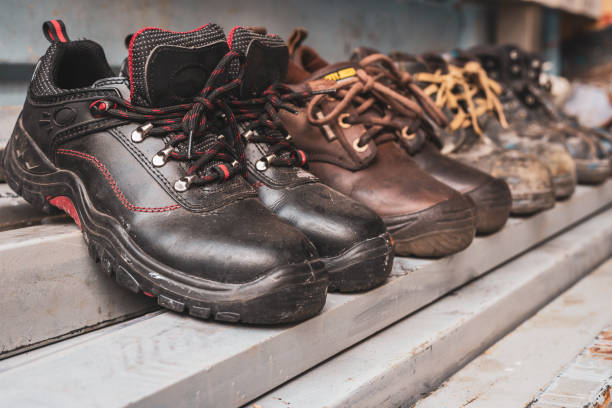Safety Shoes: Intro
Safety shoes play a crucial role in various industries across the United Arab Emirates (UAE). Whether in construction, manufacturing, oil and gas, or any other field that involves potential hazards, wearing appropriate safety shoes UAE is paramount to ensuring the well-being and protection of workers.
Importance of Safety Shoes in the UAE
In the bustling industries of the UAE, where construction projects soar and industrial activities thrive, the need for safety measures cannot be overstated. Shoes, among other personal protective equipment (PPE), are indispensable in safeguarding workers against potential injuries and accidents in the workplace.
Protection from Hazards
shoes are designed to offer protection against a multitude of workplace hazards. These include:
- Impact Protection: Heavy objects or equipment falling on the feet can cause severe injuries. shoes with reinforced toe caps made from steel, aluminum, or composite materials provide ample protection against such impacts.
- Puncture Resistance: In environments where sharp objects or protruding nails pose a risk, puncture-resistant soles in shoes prevent injuries caused by penetrating objects.
- Slip Resistance: Workplaces in the UAE may have slippery surfaces due to oil, water, or other liquids. shoes with slip-resistant outsoles offer stability, reducing the risk of slips and falls.
- Electrical Hazard Protection: For workers in electrical industries, safety shoes with insulating properties protect against electric shocks and electrocution.
Types of Safety Boots
Several types of safety shoes are available in the UAE to cater to specific industry requirements. These include:
- Steel-Toe Boots: These are among the most common safety shoes, featuring a protective reinforcement in the toe area to safeguard against impact and compression.
- Composite-Toe Boots: Similar to steel-toe boots but made of non-metal materials like carbon fiber or plastic. They offer comparable protection but are lighter in weight.
- Metatarsal Boots: Offering extended protection to the metatarsal bones, these boots cover the instep area, providing additional shielding against impact and compression.
- Electric Hazard (EH) Boots: Designed for electrical workers, EH boots provide insulation to protect against electrical shocks.
- Chemical-Resistant Boots: Ideal for industries dealing with chemicals or corrosive materials, these boots prevent chemical spills from causing harm to the feet.
Compliance and Regulations
In the UAE, adherence to safety standards is paramount. Employers must ensure that safety shoes comply with relevant regulations and standards set forth by authorities to guarantee the effectiveness of protective footwear.
Factors Influencing Safety Shoe Selection
Comfort and Fit
Besides protection, comfort is essential for ensuring that workers wear their safety shoes consistently. Ill-fitting or uncomfortable footwear can lead to discomfort, blisters, or foot fatigue, affecting productivity. Therefore, choosing shoes with proper fit and ergonomic design is crucial.
Durability and Longevity
In industries with rigorous working conditions, the durability of safety shoes is vital. High-quality materials and construction ensure longevity, reducing the frequency of replacements and contributing to cost-effectiveness.
Temperature Regulation
Given the extreme weather conditions prevalent in the UAE, safety shoes that incorporate breathable materials help in temperature regulation, preventing excessive sweating and discomfort, especially during hot seasons.
Employer Responsibility and Employee Awareness
Employers bear the responsibility of providing appropriate safety shoes to their workforce. They should conduct thorough assessments of workplace hazards to determine the type of footwear required. Additionally, training sessions highlighting the importance of safety shoes and their proper usage can significantly enhance employee awareness and compliance.
Advancements in Safety Shoe Technology
With continuous advancements in technology, safety shoe manufacturers have introduced innovative features to enhance protection and comfort. These include shock-absorbing soles, anti-fatigue insoles, moisture-wicking lining, and lightweight yet robust materials. Staying updated with these advancements allows companies to provide their employees with the latest and most effective safety footwear.
The Role of Regulations and Standards
Adherence to local and international safety standards is imperative for safety shoe manufacturers, distributors, and employers. In the UAE, ensuring compliance with regulations set by authorities such as the Emirates Authority for Standardization and Metrology (ESMA) or international standards like the American National Standards Institute (ANSI) reinforces the credibility and effectiveness of safety footwear.
Conclusion
The use of appropriate safety shoes UAE various industries is non-negotiable. They not only protect workers from injuries but also enhance productivity by instilling confidence and comfort while performing tasks. Employers must prioritize the provision of suitable safety footwear, ensuring the well-being and safety of their workforce in every operational aspect.




